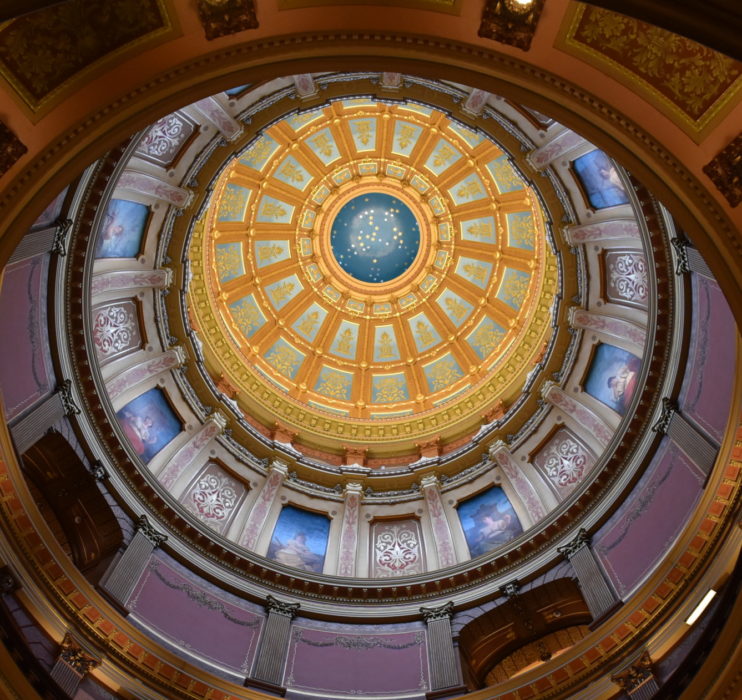
A budget of nearly $77 billion was catapulted to the Governor’s office ahead of the recent holiday. However, with tax relief compromises still to be made, one economic professional wonders how it’ll weather a recession.
In an interview with MIRS, Robert Schneiderof the Citizens Research Council – and former associate director of the Michigan House Fiscal Agency – said there’s really not a downside to the historic Fiscal Year 2023 budget passed by the Legislature last week. But if has a shortcoming, Schneider said it could be lack of safeguards “to make it more recession proof.”
“The dreary worry would be a U.S. recession that pulls the rug out from under our feet, and if that doesn’t happen, we should be in really good shape budget-wise looking out over the next five years,” Schneider said. “I think we probably are in pretty decent shape relative to the average state, but if you add in another $1 billion to the rainy day fund, $750 million … now you have enough to weather a moderate to bad recession.”
Schneider said that the longevity of the budget’s success could ultimately depend on drawing down on Michigan’s budget stabilization fund – which wears the nickname of the “rainy day” account.
HB 5783 – the big budget bill – would deposit an additional $180 million into the rainy day account, expanding its total to $1.64 billion – which is nearly 5% of the state’s School Aid Fund (SAF) and General Fund (GF).
Around 2:50 a.m. on Friday, after the Senate approved the budget legislation, Senate Appropriations Chair Jim Stamas (R-Midland)described the new boost in the stabilization fund as “huge.”
“I don’t think we’ve ever seen that in Michigan’s history,” he said, adding the new budget is also a “record-amount of debt that’s been paid down in a single time. I think it plays well.”
While drafting the budget, Stamas said more than $150 billion worth of requests were submitted, pushing lawmakers to navigate through a colossal quantity of demand from various stakeholders.
The new budget further devotes $750 million into a debut grant program assisting local governments to manage legacy debt and unfunded liabilities. Regardless of the budget’s unprecedented size, around $7 billion – $3.8 billion in GF dollars and $3.2 billion in SAF money – remains leftover.
This residual allowance stands ripe to be used for tax relief, but some warn more should be infused into the rainy day fund.
“Given how much one-time revenue we have right now, it would – to me – be wise to add some more to the budget stabilization fund to make this budget more recession-proof … and the good thing is, you can do that – you can add $500 million, $750 million, maybe even $1 billion … and still have enough money to enact some combination of ongoing tax relief,” Schneider said.
Schneider said during the early days of the COVID-19 pandemic, some observers suggested states should invest about 10% of their combined revenue to equip their rainy day funds for a moderate to serious recession.
He said if Michigan opts to spend all of its excess revenue on tax relief – not holding any back – the state will feel a pinch as more than 50% of economic forecasters await a national recession.
Schneider said even after the state’s rainy day fund was worth more than 6% of its revenues in the late 1990s, the 2000 recession drained it within a couple of years.
In their current form, legislation on the table – or that has already been voted on – for potential tax relief formulas include:
- Sen. Wayne A. Schmidt (R-Traverse City)’s SB 417, expanding the state’s Earned Income Tax Credit up to 30% by tax years occurring after 2024. At this point, it would cost the state around $460 million annually, although it would not impact the SAF because its collection system excludes the revenue effect of tax credits.
- SB 972, SB 973 and SB 974 to pause the state’s sales and use tax on motor fuel for 92 days would subtract between $43.8 million and $46.1 million from the General Fund and between $266.3 million and $280.5 million from the SAF.
- In its original form from Jan. 26, Sen. Aric Nesbitt (R-Lawton)’s since-vetoed SB 768 to reduce the individual income tax rate from 4.25% to 3.9% would cost the General Fund up to $747.5 million during its initial fiscal year, $1.09 billion during the second and up to $1.12 billion afterward.